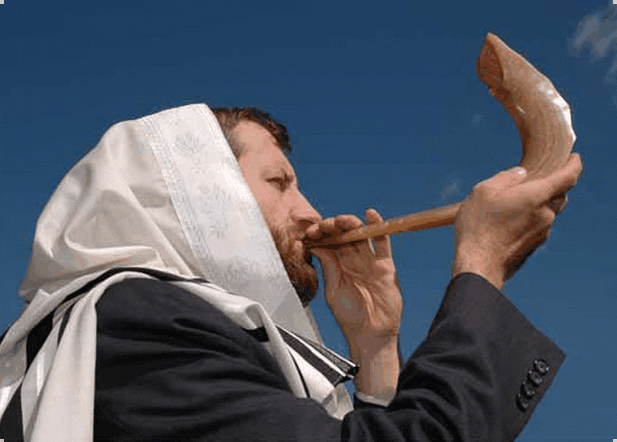
The Torah obligation of blowing the Shofar requires one to hear three sets of three blasts, with each set consisting of Tekiah (a long blast), Teruah (a shorter blast) and another Tekiah. These blasts should be based on the order of the additional blessings made during the Musaf prayer- Malchuyot, Zichronot and Shofarot.
The Talmud (Rosh Hashana 16a) asks: Why do they blow when standing and also when sitting? In order to confuse Satan.” According to tradition, the Shofar has the ability to influence Hashem to move from the attribute of Judgment to the attribute of Mercy and therefore the Satan wishes to intervene and prevent Jews from blowing the Shofar. Blowing before the actual point when it is obligated, and when people are sitting down as they are before the silent prayer, confuses Satan and enables us to blow without disturbance in the silent prayer.
If so, so far we have a basis for 18 blasts, nine before the silent prayer and nine during the prayer itself. However the Talmud discusses what a Teruah is at length. The Mishna says that a Teruah is three Yevavot, meaning three sobs. But what defines sobbing? On this the Talmud is in doubt- is it defined as a whimper or as a wail? Since this remains in doubt we have to incorporate both types of cries in the Shofar blasts. For this reason the Amoraim instituted both types of blasts, and since each one of them might be considered to be an interruption we must do 9 with Teruah (like a wail), nine with Shevarim (like a whimper) and 12 with both types together, as they are considered to be 2 separate blasts and before and after each of these there must be a Tekiah.
Thus the order is:
|
Tekiah |
Shevarim |
Terua |
Tekiah |
|
Tekiah |
Shevarim |
Terua |
Tekiah |
|
Tekiah |
Shevarim |
Terua |
Tekiah |
|
Tekiah |
Shevarim |
Tekiah |
|
Tekiah |
Shevarim |
Tekiah |
|
Tekiah |
Shevarim |
Tekiah |
|
Tekiah |
Terua |
Tekiah |
|
Tekiah |
Terua |
Tekiah |
|
Tekiah |
Terua |
Tekiah |
We now understand that there ought to be 30 blasts and this is indeed the amount we blow prior to the silent prayer, as well as after the silent prayer, this in order to confuse the Satan. However according to the Torah we should also blow during the silent prayer, when saying the Malchuyot, Zichronot and Shofarot. For each of these blessings we blow 10 blasts.
Why don’t we blow 30 blasts at this point? The Rif, Rabbi Yitzchak Alfasi, explains that we have already fulfilled our Torah obligation by hearing the blasts before the silent prayer and therefore we do not need to hear the full 30 blasts, as this would “bother the community”. He therefore says one should only blow 10 blasts, but how should these blasts be divided up? Rif says that for Malchuyot we blow Tekiah- Shevarim-Terua- Tekiah, for Zichronot Tekiah-Shevarim-Tekiah and for Shofarot Tekiah-Terua-Tekiah. However this will not fulfill any requirement as the Torah requires 9 blasts from the appropriate type.
Rabbeinu Tam maintains that one should blow 10 blasts for each of the blessings and this should be done during the repetition of the prayer and not during the silent prayer. He does not see this as a “bother to the community”. He also says that all these should be Tekiah- Shevarim-Terua-Tekiah and the problem of interruption does not prevent one from fulfilling his obligation de facto.
Thus we see that there are two possible customs regarding blowing the Shofar during the Musaf prayer. Some blow in the silent prayer and some in the repetition, but this still doesn’t explain the 100 blasts. The Aruch writes that there is a custom to blow 100 blasts but his reasoning for this is unclear. He connects this with the hundred “sobs” of the mother of Sisera, but what does this have to do with Rosh Hashana? Possibly this is to contrast our supplications with hers; she wanted her husband to succeed in battle against the Jews, while we ask for peace in the world and recognition of G-d’s sovereignty.
For some people it would be very confusing to blow during the silent prayers. For this reason in most Ashkenazic communities the custom is to blow 30 before the silent prayer, 30 during the repetition, 30 afterwards and then 10 more to complete the 100. However Sephardim and Hasidim tend to blow during the silent prayer as was the custom in earlier times.
Yemenites indeed only blow 40 blasts in accordance with the ruling of the Shulchan Aruch and the Rif and as explained above.
